FEATURES|THEMES|Women
Interview with Zorigma Budaeva: Abbess of the Only Female Buddhist Monastery in Russia
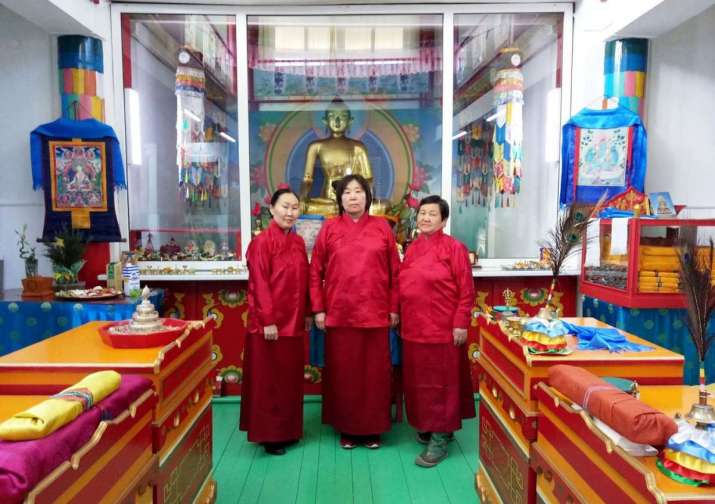 Zorigma Budaeva, center, with Erzhena Dabaeva from Buryatia and Yondon Chimgee from Mongolia, 2019. Image courtesy of of Zorigma Budaeva
Zorigma Budaeva, center, with Erzhena Dabaeva from Buryatia and Yondon Chimgee from Mongolia, 2019. Image courtesy of of Zorigma BudaevaZorigma means “courageous” in the Buryat language. It requires courage and dedication to be the abbess of the only female Buddhist monastery in Russia. The Buddhist Female Datsan Zungon Darzhaling (“Prosperous and Noble Monastery”) is located in the Buryat capital Ulan-Ude. Its main building was consecrated in 2002, and two years later Zorigma Budaeva became its abbess. Her parents, Darima Tsynguyeva and Dalai Budayev, were founders of the monastery. Zorigma studied in spiritual educational institutions in Mongolia and always felt grateful to the teachers there as well as to her own teachers, Basaan Lama, Tuvan Dorjo Lama, Gantumer Tergun, Yonten Gyaltso, and Shridevi Bagsha.
Buddhistdoor Global: How did you begin your Buddhist practice?
Zorigma Budaeva: It is difficult for me to answer this simple question. What should we consider as a Buddhist practice? Living with faith in the Three Jewels? Reading prayers and welcoming people with their problems? Or observing the Vinaya (rules of moral conduct)? I would like to say right away that monastic discipline in its pure form is not my goal, since I live a secular life. All of us in our datsan (Buddhist monastery) are laypeople. I have been reading prayers since I came to Zungon Darzhaling and this has become my work.
Everything related to faith is very complicated. I grew up in the Soviet Union where atheism was promoted. My parents were believers, but I had to hide it like many others. I often had to deal with contradictions. Everyone at school and at the institute (of higher education) was raised atheist, but at home there were meetings with people who were far from atheism, who recited prayers, performed rituals, and some even had psychic abilities. My parents were very respectful to them.
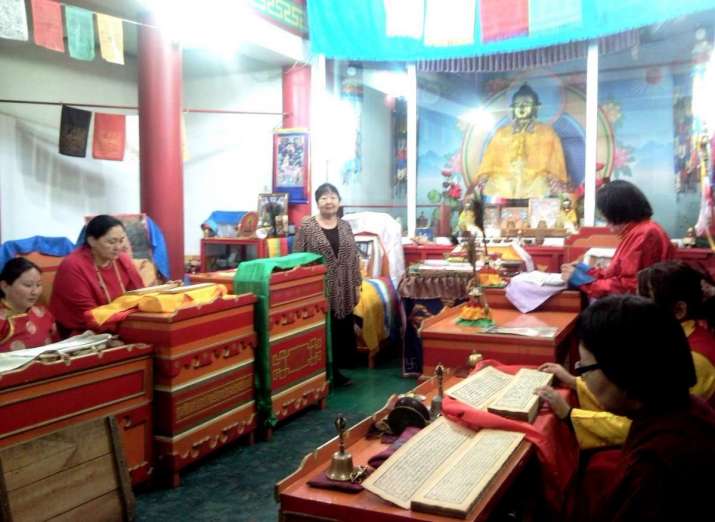 The abbess of the Mongolian Buddhist Women’s Center, Tugs Bayasgalant, with her students, Samten Wangmo from India and Darima Tsynguyeva, center, at the Buddhist Female Datsan Zungon Darzhaling, 2010. Image courtesy of of Zorigma Budaeva
The abbess of the Mongolian Buddhist Women’s Center, Tugs Bayasgalant, with her students, Samten Wangmo from India and Darima Tsynguyeva, center, at the Buddhist Female Datsan Zungon Darzhaling, 2010. Image courtesy of of Zorigma BudaevaAt that time, there was a tradition of collecting offerings (products, money, and belongings) during Sagaalgan (Buryat New Year) for lamas serving in Ivolginsky Datsan.* My maternal grandfather was responsible for collecting offerings in the datsan of his own village, and my father helped him deliver them to Ivolga village. Sometimes we visited the lamas. I liked one old lama very much—he always had sweets on his altar. When he gave me sweets, I felt a great joy. We very rarely had sweets in our house. Once, I was very sick so my parents invited the lama to read prayers for me and after that I felt much better. Describing this, I want to emphasize that since my childhood there were clergymen in my life, but in my perception they were ordinary people with their own emotions, personal characteristics, and everyday problems. However, respect and reverence for them were always present in our life, as these feelings were instilled by my parents.
I had a successful secular life—I graduated from the institute for higher education, completed my aspirantura (doctoral studies),** defended my dissertation for my Candidate of Science degree, worked as an assistant professor in the Department of Special Pedagogy and Psychology, received the title of assistant professor and was going to defend my Doctor of Science dissertation, but then my parents founded the Buddhist Female Datsan Zungon Darzhaling. They had a great influence on me, saying that they saw my future in the datsan. Thus, I came to Buddhism as an abbess. In my life there have been many meetings with interesting people and various situations, and I hope that there will be more—a new understanding of the practice of Buddhism is revealed to me every time in a new way.
BDG: What are your responsibilities as an abbess?
ZB: I’ve never thought about this before. Only now I realize that I am responsible not only for ritual activities and economic issues, but also for the women who need my help and sometimes I have to act as a psychotherapist.
As I said, I have to solve not only spiritual issues, but also economic ones. I have to deal with the financial support of the datsan, planning activities and organizing various events, and at the same time I have to recite prayers and advise people who come to our temple in search of spiritual help. It is very difficult to find a balance between the spiritual and the material.
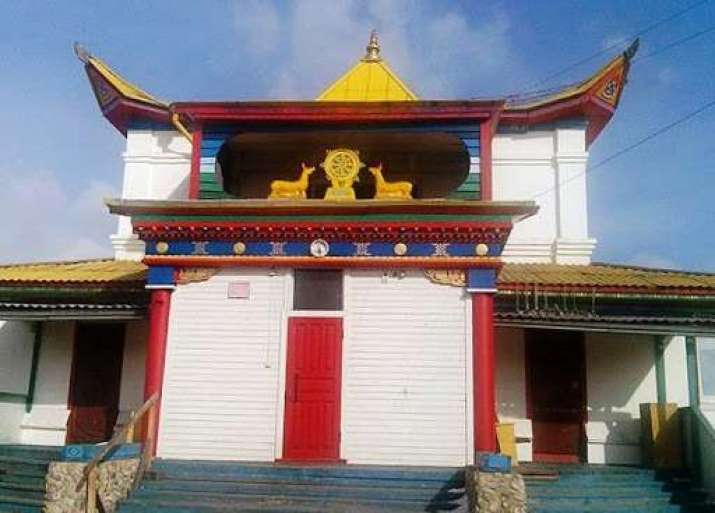 The Buddhist Female Datsan Zungon Darzhaling. From uutravel.ru
The Buddhist Female Datsan Zungon Darzhaling. From uutravel.ruBDG: How many women are involved in the work of the datsan?
ZB: The number of women involved in the activities of Zungon Darzhaling is constantly changing due to everyday problems and financial difficulties. At the beginning of the datsan’s activities, women from Mongolia held religious services. They were from the Mongolian Buddhist Women’s Center Tugs Bayasgalant (“Heaven of Joy”), and we maintain long-standing friendly ties with them. Now five women are working in our temple.
BDG: What are some of the problems and challenges for Buddhist women in Buryatia?
ZB: I do not think that Buddhist women in Buryatia have any special problems. Indeed, there is an advantage in the fact that this is a region where Buddhism has traditionally been practiced. The peculiarity here is that people believe that the ceremonies held by the clergy can solve all problems. It seems to me that the most important work of Buddhist practice is self-realization.
Our datsan is the first and the only one in Russia exclusively for women. To be first is always difficult. There are many Buddhist temples in Buryatia, but there were no female temples. Therefore, on the side of male lamas, a condescending and sometimes neglectful attitude was observed. It can also be considered a problem that there is no unity within the ranks of Buddhist women. We all are Buddhists, but each of us has our own view, our own teacher, and our own vision of the teachings, but this is associated more with personal problems. In my opinion, the main problem is subjectivity and ambitiousness, and the lack of common ground. It’s possible that I’m wrong as any opinion is subjective.
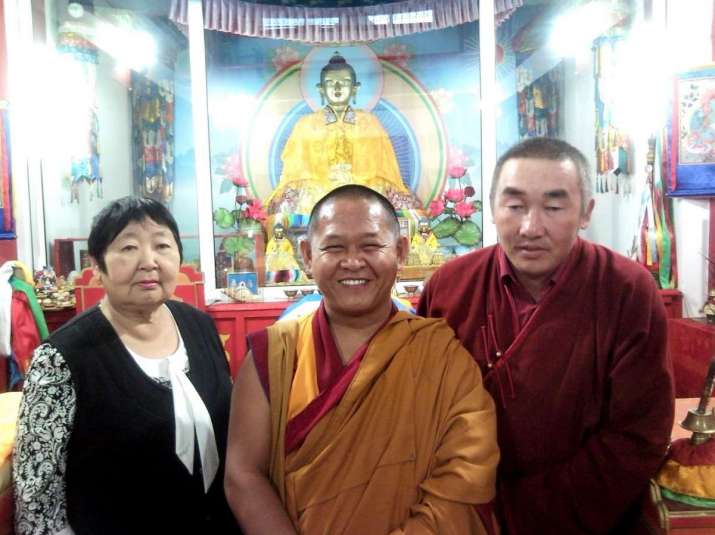 Darima Tsynguyeva, mother of Zorigma Budaeva, with Geshe Dakpa Jampa from Drepung Loseling Monastic University in India and Zhargal Lama at the Buddhist Female Datsan Zungon Darzhaling, 2009. Image courtesy of Zorigma Budaeva
Darima Tsynguyeva, mother of Zorigma Budaeva, with Geshe Dakpa Jampa from Drepung Loseling Monastic University in India and Zhargal Lama at the Buddhist Female Datsan Zungon Darzhaling, 2009. Image courtesy of Zorigma BudaevaBDG: What would you like to say to Buddhist women all over the world in support of their Dharma practice?
ZB: I am very glad that Buddhism is becoming widespread. I find it wonderful that more people follow Buddhism. “A drop of water can hollow a stone” or a chain of rebirths should lead to enlightenment. It is permissible that many people do not realize, or rather, do not completely allow the Buddhist spiritual values to pass through their hearts. The main thing is that a step or an attempt is made to understand them.
It seems to me that we must not forget that Buddhism is not only a philosophy, but above all it’s a religion. Faith is a characteristic of religion. Mysticism exists, since I encounter facts when faith and prayers change events in a person’s life. One cannot pragmatize faith.
I try to follow scientific research, although it is impossible to embrace the immensity. Scientific achievements are only an extension of the sphere of our understanding of the world order. Faith is something that mobilizes us to enact feats. Faith is the basis of sincere devotion to the teaching, but it should not be fanatical. Rely on faith and follow the Middle Way—this is my sincere wish to everyone.
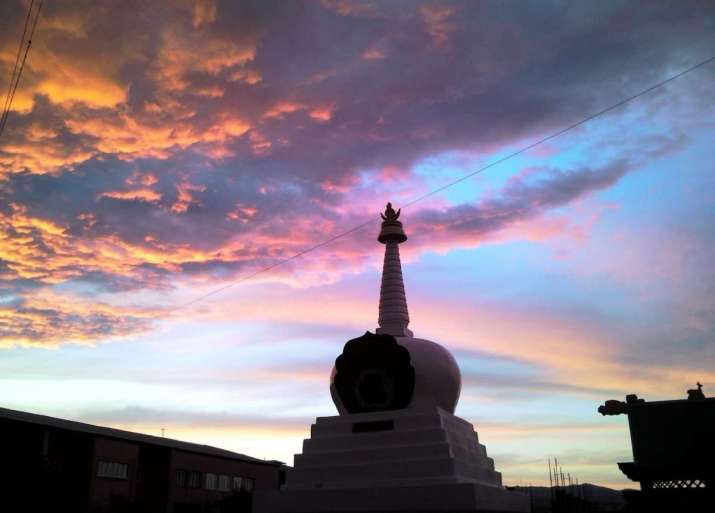 Stupa at the Buddhist Female Datsan Zungon Darzhalin. Image courtesy of Zorigma Budaeva
Stupa at the Buddhist Female Datsan Zungon Darzhalin. Image courtesy of Zorigma Budaeva* Ivolginsky Datsan is the most famous Buddhist temple in Buryatia, located 23 kilometers from Ulan Ude, near the village of Verkhnyaya Ivolga.
** In Russia, doctoral studies have two levels: the Candidate of Science (candidate nauk) is equivalent to a standard Doctor of Philosophy degree elsewhere in Europe, while the Doctor of Science (doctor nauk) is more similar to a post-doctoral degree.
Related features from Buddhistdoor Global
The Only Female Buddhist Monastery in RussiaThe Mystical Image of Sarasvati in Buryatia
Faces of the Buddhist Goddesses: An Interview with Aryuna Balzhurova
The Largest Depiction of the Buddha in Russia
Construction of Avalokiteshvara Statue Underway in Buryatia
Buddhist Holy Sites of the Russian Steppes
Related news from Buddhistdoor Global
Jhado Tulku Rinpoche Confers Kalachakra Empowerment in Buryatia
Museum of History of Buryatia Holds 20th Anniversary Exhibition of the Atlas of Tibetan Medicine
Venerable Yelo Rinpoche Visits Kalmykia
Kalmyk Musical Performance of the Buddha’s Life Presented in Tuva and Buryatia














